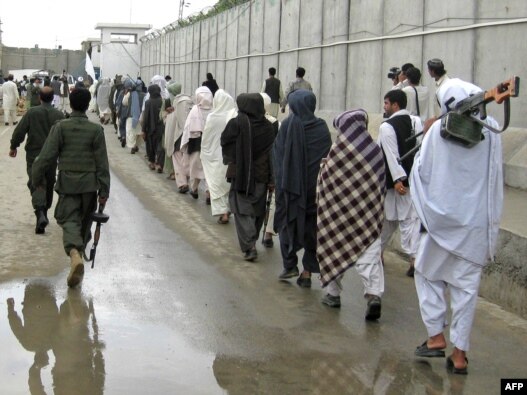UN separates Al-Qaeda and Taliban sanctions
| Publisher | Radio Free Europe/Radio Liberty |
| Publication Date | 17 June 2011 |
| Cite as | Radio Free Europe/Radio Liberty, UN separates Al-Qaeda and Taliban sanctions, 17 June 2011, available at: https://www.refworld.org/docid/4e142b63c.html [accessed 28 May 2023] |
| Disclaimer | This is not a UNHCR publication. UNHCR is not responsible for, nor does it necessarily endorse, its content. Any views expressed are solely those of the author or publisher and do not necessarily reflect those of UNHCR, the United Nations or its Member States. |
June 17, 2011
By RFE/RL
 Taliban fighters peacefully surrender their arms during a meeting with Afghan government officials as part of the government's peace and reintegration process in Kandahar
Taliban fighters peacefully surrender their arms during a meeting with Afghan government officials as part of the government's peace and reintegration process in Kandahar
The UN Security Council has voted unanimously to treat the Taliban and Al-Qaeda separately.
Up till now, UN sanctions have targeted the Taliban and Al-Qaeda together.
One resolution established a Taliban blacklist and the other an Al-Qaeda blacklist of individuals facing travel bans and asset freezes.
The U.S. Ambassador to the UN Susan Rice said the council had taken "important steps" to respond to the evolving and distinct threats posed by Al-Qaeda and the Taliban.
Germany's UN Ambassador Peter Wittig, who is also the chairman of the Security Council's Al-Qaeda and Taliban Sanctions Committee, said the move would help reconciliation efforts in Afghanistan.
"There are [now] clearer criteria for listings and de-listings in the Taliban regime. There is a role for the Afghan government in the listing and de-listing process. The Afghan government will have to be consulted, so it gives them additional ownership in the whole process," Wittig said.
Russia's UN Ambassador Vitaly Churkin cautioned that Taliban de-listings have to be done only on a case-by-case basis and after careful consideration.
Afghanistan's UN Ambassador Zahir Tanin told Reuters in a telephone interview earlier this week that the move "gives us more flexibility. It will help to create a regime of engagement for people to join the peace process."
Link to original story on RFE/RL website
